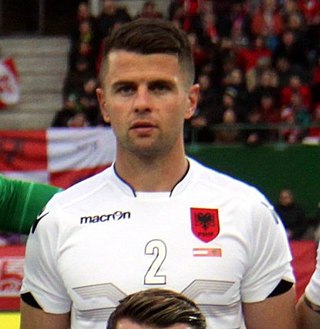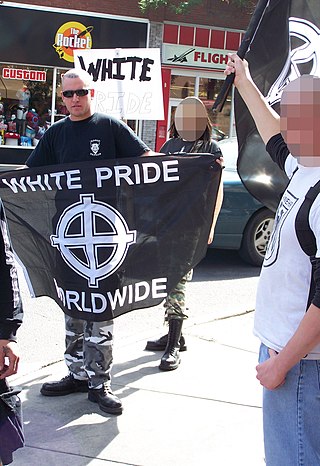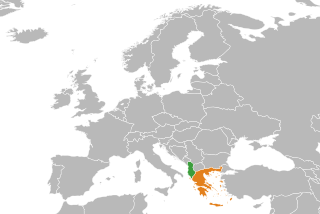Related Research Articles

The Democratic Party of Albania is a conservative political party in Albania. It has been the largest opposition party in the country since 2013.

Anti-Racist Action (ARA), also known as the Anti-Racist Action Network, is a decentralized network of militant far-left political cells in the United States and Canada. The ARA network originated in the late 1980s to engage in direct action and doxxing against rival political organizations on the hard right to dissuade them from further involvement in political activities. Anti-Racist Action described such groups as racist or fascist, or both. Most ARA members have been anarchists, but some have been Trotskyists and Maoists.

Grigoris Lambrakis was a Greek politician, physician, athlete, and lecturer. He participated in track and field sports and was a member of the faculty of the School of Medicine at the University of Athens. A member of the Greek resistance to Axis rule during World War II, he later became a prominent anti-war activist. His assassination by right-wing zealots that were covertly supported by the police and military provoked mass protests and led to a political crisis.

The Popular Association – Golden Dawn, usually shortened to Golden Dawn, is a far-right neo-Nazi ultranationalist criminal organisation and former political party in Greece. Golden Dawn rose to prominence during Greece's financial crisis of 2009, becoming the third most popular party in the Greek parliament in the January 2015 election. Its support has since plunged, and it failed to enter parliament in the 2019 election. The criminal trial against the leaders, frequently described as the largest trial of Nazis since the Nuremberg trials, lasted more than five years.
Racism in Russia mainly appears in the form of negative attitudes towards non-ethnic Russian citizens, immigrants or tourists and negative actions against them by some Russians. Traditionally, Russian racism includes antisemitism and Tatarophobia, as well as hostility towards the various peoples of the Caucasus, Central Asia, East Asia and Africa.
Anarchism in Greece traces its roots to ancient Greece but was formed as a political movement during the 19th century. It was in the ancient era that the first libertarian thoughts appeared when philosophers based on rationality questioned the fundamentals of tradition. Modern anarchism in Greece emerged in the 19th century, heavily influenced by the contemporary European classical anarchism. Because of the Bolshevik success in the Russian Revolution of 1917 and the rise of the Communist Party, anarchism faded after the first decades of the 20th century. The collapse of the military junta put an end to the monopoly of the political power from the Right, whereas the dissolution of the Soviet Union diminished the allure of the Communist Party of Greece allowing anarchist groups to gain pace in Athens and other cities.

Tepelenë is a city and a municipality in Gjirokastër County, in the south of Albania. The town is on the left bank of the Vjosa River, about three kilometres downstream from its union with the Drino.
Racism in association football is the abuse of players, officials, and fans because of their skin colour, nationality, or ethnicity. Some may also be targeted because of their association with an opposing team, although there have been instances of individuals being targeted by their own fans. The topic of racism in association football has been widely covered by the media and in academic studies. There have been a range of responses by various associations, such as FIFA and UEFA, as well as by teams, and individual players and managers to address the problem.

In 1997, Albania experienced widespread civil unrest due to economic problems caused by the collapse of pyramid schemes. The large sums of money siphoned from the government to fund these schemes led to the collapse of the Democratic Party's government in January 1997. The conflict, which lasted until August 1997, resulted in the deaths of more than 2,000 people. The establishment of a new government occurred as revolutionaries surrounded Tirana. Various sources also describe the ensuing violence as a rebellion or even a civil war.
Konstantinos A. Plevris, sometimes called in English Constantine Plevris or Kostas Plevris, is a Greek politician, lawyer, nationalist, and author. The prolific writer has, over the course of decades, written a number of books and other texts relating to Greek history, Greek culture, sociology, and politics, with a clear nationalist, homophobic content. In his book The Jews: The Whole Truth, he described himself as a "Nazi, fascist, racist, anti-democrat, anti-Semite". He was the founder and leader of the Metaxist 4th of August Party and Front Line, with the former political party not only playing a significant role in influencing and shaping the future direction of the Greek extreme right but also being itself as a prominent political movement before the Greek junta in general. He has also co-operated with various European neo-fascist groups, and figures such as Pino Rauti, Pino Romualdi, Giorgio Almirante. He later briefly joined the right-wing party Popular Orthodox Rally and was its leading candidate in the 2004 elections. He is the father of Thanos Plevris, member of the Greek parliament formerly with the Popular Orthodox Rally party, now with New Democracy.

Andi Lila is a former Albanian professional footballer who played as a defensive midfielder. He was a versatile player, having spent his early career as a full-back.

The Aryan Guard was a neo-Nazi terrorist organization based in Alberta, Canada, whose members are primarily located in the city of Calgary. It was founded in late 2006, and was reported to have disbanded in 2009 as a result of internal conflict including pipe bombing attacks. However, the group denied this late in 2009, and claimed it was still operating.
Racism has been a recurring part of the history of Europe.

Albania–Greece relations are diplomatic relations between Albania and Greece. They are influenced by factors such as the presence of Albanian immigrants in Greece, the Greek minority in Albania, historical and cultural ties, and interactions between the governments of both countries.
In 1991, the Socialist Party of Albania, with specific social democratic ideology took control of the country through democratic elections. One year later the Democratic Party of Albania won the new elections. After 1990, Albania has been seeking a closer relationship with the West. What followed were deliberate programs of economic and democratic reform, but the implementation of capitalism led to the proliferation of pyramid schemes. Chaos in late 1996 to early 1997, as a result of the collapse of these pyramid schemes, alarmed the world and prompted the influx of international peacekeeping forces. In 1995, Albania was accepted into the Council of Europe and requested membership in NATO and is a potential candidate country for accession to the European Union. The workforce of Albania has continued to emigrate to Western countries, especially Greece and Italy.
Anti-Albanian sentiment or Albanophobia is discrimination and prejudice towards Albanians as an ethnic group, described primarily in countries with a large Albanian population as immigrants, seen throughout Europe.
Racism in Israel encompasses all forms and manifestations of racism experienced in Israel, irrespective of the colour or creed of the perpetrator and victim, or their citizenship, residency, or visitor status. More specifically in the Israeli context, racism in Israel refers to racism directed against Israeli Arabs by Israeli Jews, intra-Jewish racism between the various Jewish ethnic divisions, historic and current racism towards Mizrahi Jews although some believe the dynamics have reversed, and racism on the part of Israeli Arabs against Israeli Jews.
Antisemitism in Greece manifests itself in religious, political and media discourse. The 2009–2018 Greek government-debt crisis has facilitated the rise of far right groups in Greece, most notably the formerly obscure Golden Dawn.
The Bufi Government better known as the Government of Stability was an interim government formed after the resignation of the previous Nano government due to the aggravated situation in the country after the events of 2 April 1991 where 4 opposition supporters were killed in Shkodër during a anti-communist protest that led to the burning of the Shkodra Labor Party Committee. The Nano government resigned on 4 June 1991, and the next day the then-President Ramiz Alia, began negotiations to form a comprehensive government whose main objective would be to restore stability to the country, from which it took the name "Stability Government". Ylli Bufi was accepted also by the opposition to be appointed as Prime Minister, while one of the most prominent figures of the Democratic Party, such as Gramoz Pashko, was appointed Deputy Prime Minister.
References
- 1 2 «Συχνά έμπλεκε σε καβγάδες»
- 1 2 3 4 5 Varouhakis, Miron (9 September 2004). "Anti-racism rally held after deadly soccer game". USA Today . Archived from the original on 2019-05-23. Retrieved 28 December 2010.
- ↑ "Greek Committee of Helsinki". Archived from the original on 2012-03-08. Retrieved 2010-12-28.
- 1 2 ""Έσπασαν" τα ισόβια για τον Π. Κλάδη-Ξιφίτα". Zakynthos Day. January 2010. Retrieved 28 December 2010.
- ↑ Albanian Parliament declaration
- ↑ "Anarchist block at antiracist demo in Athens". ALTER-E. Retrieved 28 December 2010.
- 1 2 Kantouris, Costas. "Anti-racism rally held after deadly Greece-Albania soccer clash". AP Worldstream. Associated Press. Archived from the original on 5 November 2012. Retrieved 28 December 2010.
- ↑ Zirin, Dave (2007-06-01). Welcome to the Terrordome: the pain, politics, and promise of sports . Haymarket Books. p. 95. ISBN 978-1-931859-41-7 . Retrieved 28 December 2010.
- ↑ ATA news agency, Tirana Protest against violence against Albanian soccer fans held in Greek capital Archived 2016-03-05 at the Wayback Machine , September 10, 2004
- ↑ "Albania buries and honors fan killed after weekend win over Greece". AP Worldstream. Associated Press. Archived from the original on 5 November 2012. Retrieved 28 December 2010.